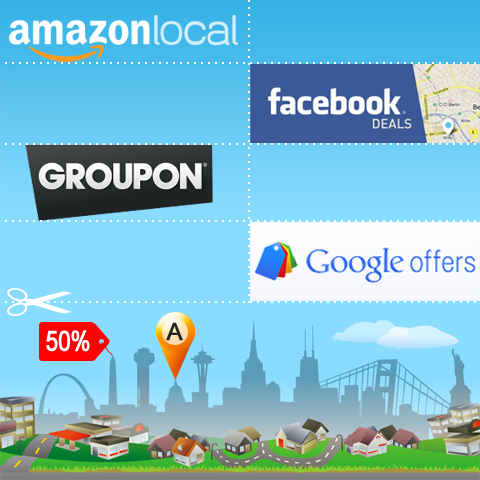Extreme couponing for all is here to stay! Beware!

With so many of the key Internet players now muscling in on the Groupon action - Amazon Local, Facebook Deals, Google Offers etc., it is quite evident that ’couponing’ and group buying is here to stay in a big way.
Whilst ’couponing’ has long been a way of life for many an American, it’s not really had the same immersive impact on this side of the pond.
As a brand engineer and marketeer, I’ve always supported the couponing concept for company / product introductions / launches, but have never really been in favour of couponing as an ongoing marketing exercise. For me these companies are always far better off at employing accumulative loyalty bonus / points systems which are more impactful and more long-term rewarding for both customers and the service providers. A great example of this is Clinique’s bonus system where all buyers receive bonus gifts when they spend over a certain value at specific times throughout the year. My other favourite loyalty scheme is Boots’s - where you collect points on a card - I am really looking for all of these schemes to be wrapped up in an electronic wallet soon. A lot of these coupon schemes look to ’cheat’ the customer by limiting the scope and uptake of the coupon - so that it’s only valid for certain things at certain times - coupons are set up in such a way that a large number of customers will fail to ’cash in’ their coupons - this is why for my the Tesco system is so much worse than Boots - for Boots you always keep your points on your card - for Tesco you need to remember to tear off and take the paper coupons with you when you go shopping - HMV goes one worse with its loyalty scheme - allowing you only to access your points online, and you can only spend them on products in-store - which are pricier than the online equivalents - sure there are other bonuses, but as a supposed universal loyalty scheme, it is seriously flawed. The universal points schemes will always be much better propositions in every way - for customers and retailers alike.
For research purposes I get more than my fair share of these special offers coming my way every day - mostly restaurant offers, spa and beauty treatments, with the occasional ’day out’ type of activity. Service providers need to be aware that, as in the case of Groupon - that Groupon gets 50% of the value of the coupon sold (100% if coupon is below $10 in value) - this should only really be used as a customer acquisition strategy, and is very much a marketing campaign which has real investment costs and only potential long-term payback. Most companies that use Groupon actually ’spend’ as much as $10,000 for an exercise that lasts 3-6 months.
Groupon is really just an exercise of subsidising new customers, and can have significant impact on a company’s cashflow, as likely causing disruption and friction for existing customers. The ’offer only applicable for new customers’ is a rubbish way to reward your loyal customers. There’s plenty of horror stories of restaurants and cafes naively and unwittingly using Groupon and being unable to pay wages and overheads because they have not done the maths properly. Groupon encourages discounts of 50% plus, so let’s say you have a $20 coupon for $40 worth of goods. The retailer here only gets back $10 for the $40 value - and they don’t get paid instantly, the money comes in instalments / batches and typically 30-60 days or more after the transaction. Most businesses are heavily reliant on ongoing cashflow, and with these kinds of special offers there is usually a heavy upfront hit, with most people taking you up on the offer at the start of the promotion; several companies are failing to spot the level of investment required for such an exercise, and how long it actually takes to get paid. You also have to be very careful with the terms and conditions - to limit use of said coupons otherwise unscrupulous customers will find further ways of grafting you out of your income.
Whilst all this is going on, you regulars are having to queue longer for their service and often pay more than the mostly fleeting, temporary opportunists. A lot of businesses using Groupon reported an increase in a certain type of customer - demanding, opportunistic, rude - which often had a very negative affect on existing clientele. Companies engaging in such a promotional device need to be aware of every aspect of fall-out, and not just the potential upside of possibly getting new customers.
Over the years, our businesses have engaged in a number of promotions, and on occasion we had a huge influx of inquiries following a certain advertisement or campaign. On those occasions, the ’noise’ of such a campaign totally disrupted the daily running of the company, in such a way that most of the leads really weren’t that good - we still had to engage in the dialogues etc. - only to find that the potential customer was totally unsuitable for what we were offering - meaning we spent a lot of time chasing our tails for little or no reward. This is often the case with these promotions - as a restaurant, you are looking to acquire new regulars - but sometimes all you do is acquire new temporaries, which don’t spend / tip as well as your regulars - some of whom may have been forced to go elsewhere and have transferred their loyalties to a different establishment - there’s always a trade-off here!
Group buying itself I believe is a good thing, but only on the basis of an incremental discount based on higher volume demand - and only if you control the costs and the revenues yourself. With these ’Groupon-type’ special offer mechanics you are outsourcing the group buying and giving a 3rd party agency a 50% slice of the action which is a very signficant hit. Groupon will talk about numbers of ’eyeballs’ and exposure to a mass-market, but what you often get as a retail business is exposure of quite a different kind.
I have always been of a mind that quality goods and quality services need to be maintained at an ongoing consistent level, and these kinds of promotional spikes really disrupt the customer experience. There is a point to these kinds of services, but these are not the be all and end all of mass-marketing. As I said above, I believe it is far better to cultivate a more personalised service with ongoing loyalty being rewarded via bonuses and points - in accumulative fashion. Regular customers deserve more rewards than coupon chasers - and eventually it may be seen as a sign of bad business and poor customer service to be advertising on such special offer services!

Did you find this content useful?
Thank you for your input
Thank you for your feedback
Upcoming and Former Events
Affino Innovation Briefing 2024
Webinar - Introduction to Affino's Expert AI Solutions - Session #2
Webinar - Introduction to Affino's Expert AI Solutions - Session #1
PPA Independent Publisher Conference and Awards 2023
Meetings:
Google Meet and Zoom
Venue:
Soho House, Soho Works +
Registered Office:
55 Bathurst Mews
London, UK
W2 2SB
© Affino 2024

















